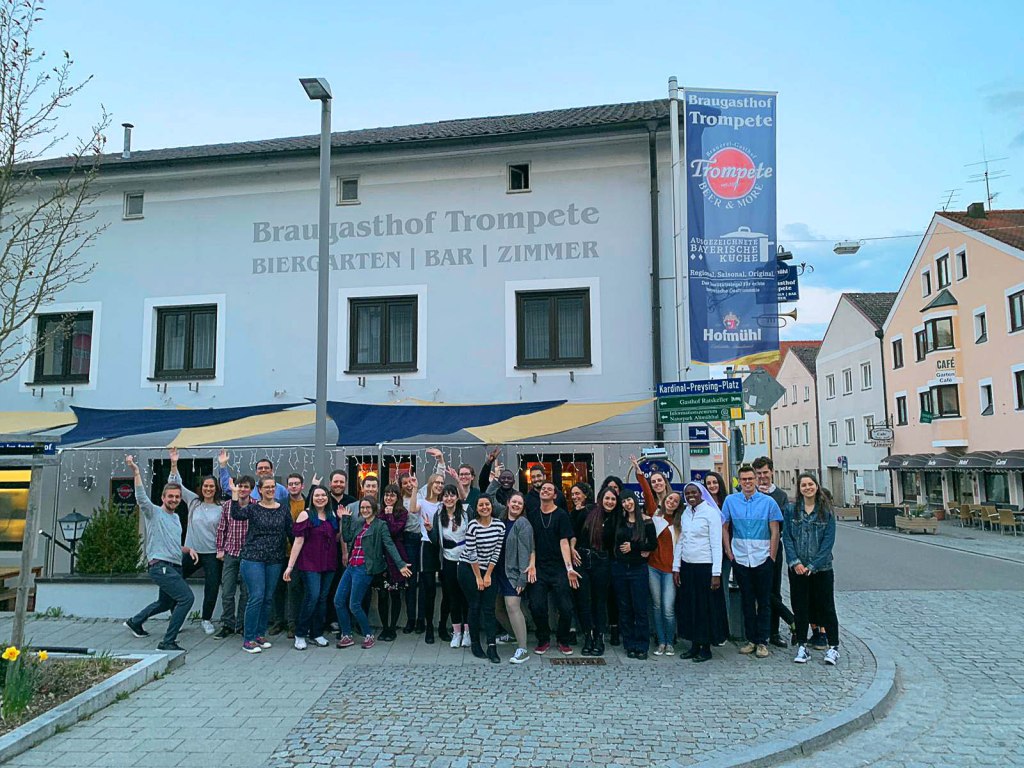Guten tag! Hello, my name is Vlad Blazhievskiy and I am excited to serve as a Gilman Alumni Ambassador for the 2020-2021 Academic Year. Thanks to the Gilman Scholarship, I spent a semester studying abroad in Germany. In Germany, I continued learning the German language at the advanced level and completed several business courses at the Kathölische Universität Eichstätt-Ingolstadt.

The group of international students who took part in the intensive German course at Katholische Universität Eichstätt-Ingolstadt
German is the fourth language in which I am working to achieve fluency. At Nebraska Wesleyan (NWU), I continued studying German by minoring and completing five semesters on campus. When I studied abroad in Germany, I used German every day for four months and practiced it everywhere. I went from grocery stores to swimming pools and even to computer repair stores. During the semester, I also took two B level intensive language courses at the Katholische Universität-Eichstätt campus. To this day, those two high-level German courses were the most challenging language classes that I took during my undergraduate. A busy semester of studying the German language enabled me to advance my German fluency from B1 to B2.2 level and forever changed my connection to the German language.
Today, I would like to spend some time helping Gilmans find ways to practice the language that some of us learned or currently learning. I hope that some of these routines that I will share will be helpful. Learning other languages has many cognitive benefits and is essential for intercultural communication. Many of us also study the language for a purpose. That might be because one of us wants to live in that language’s country or use the language for a career. While I am aware that there are no opportunities to use my German at my current job, I would like to use the language years in my future career.
Not always a person consciously wants to study the language. Therefore, I will offer some non-burdensome and straightforward ways. These shortcuts have helped me maintain German at the achieved level without a significant investment of time.
- Speak the language a small amount per day
- Speaking skills are usually lost faster than others, so take them at least 5-10 minutes a day. Do not know what to talk about? Make up a situation. Sometimes I tell myself about what bothers me (psychological relief will not hurt anyone), talk about the book I read, world news, or fashion. I also try to manage to find myself a companion to chat in German. Usually, it would be one of my friends I met in my study abroad semester. But, I have to admit, this is not so easy to do.
2. Determine which skill, besides speaking, you have the fastest weakening
- This advice is not entirely practical, but it helps me prioritize correctly and determine what is worth spending more time. To understand this, I occasionally check my skills and see which part I made the most mistakes in (grammar, vocabulary, improper use of gender, etc.), and work harder with it.
3. Translate texts from the language you learned to English
- Often, I try to find text on topics that interest me and translate it. Through this exercise, I always try to increase my vocabulary.
4. Read at night
- Reading is one of the best ways to maintain good language skills. Sometimes, I come across familiar words, repeat them, and learn new vocabulary. To not perceive reading as a routine duty, I choose those books that would be a happy read in English. My routine lately has been 10-15 minutes to read in German during the day or 5-10 pages before bed.
5. Watch Movies and TV Shows
- Don’t like to read? One other way I enjoy learning German is to watch a movie or a TV series. Watching content in its original language or with subtitles has been a practical method to learn a new language.
Whenever I am not studying or working, I take some of my free time to practice my German and remind myself about the hard work I put in while studying abroad on the Gilman Scholarship. These little routines can go a long way in practicing languages. Despite having graduated from the NWU, I frequently attend the German Coffee Hour, Kaffeestunde, to meet with my past German professors and current students who study German. I always strive to make new friendships, talk about my experience studying abroad or learning German, discuss the Gilman Scholarship, and encourage students to pursue study or intern abroad opportunities. Remember to practice your languages and please have fun doing it.
Tschüss!



